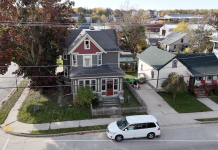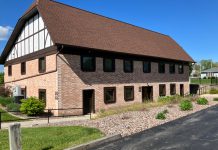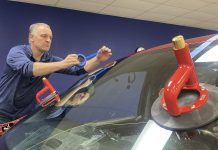Washington Co., WI – For over 15 years, Dave Bohn has been writing down memories of his childhood, growing up on the family farm, just south of West Bend on Hwy P. He hopes his writings will preserve the often-overlooked stories of ordinary farmers and everyday farm life in rural Washington County during the Great Depression through the eyes of a local farm boy.
During the Great Depression in the 1930’s, many people lost their job. Some of them became hobos and traveled around to find food and shelter and a little money.
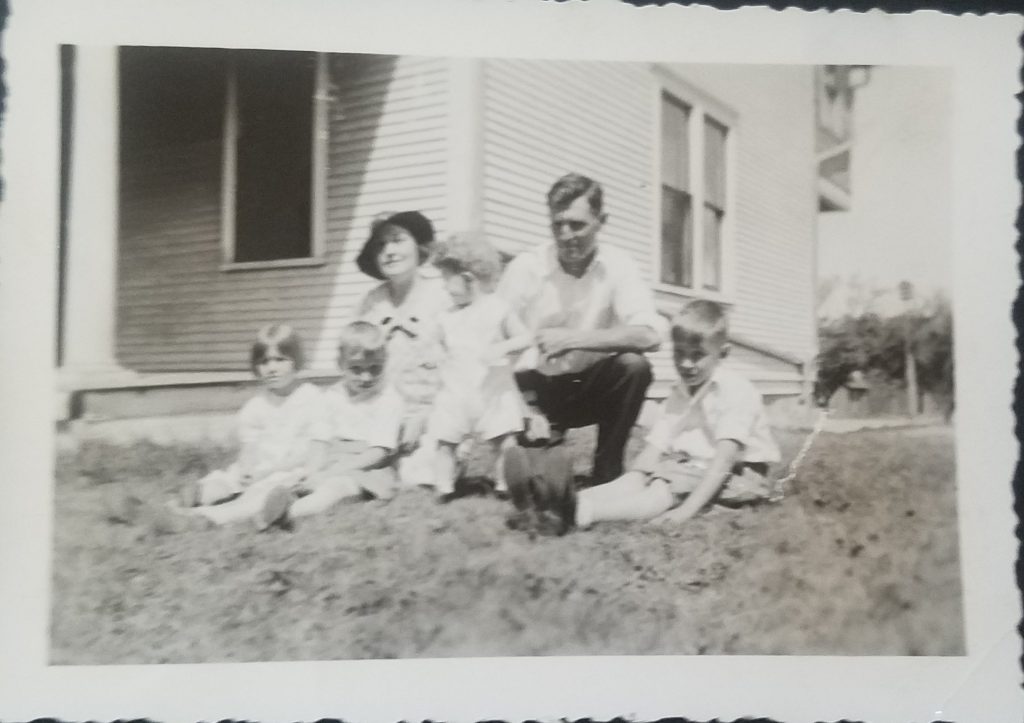
Sometimes the hobos would walk the railroad to get between towns. If they followed the railroad, most of the time they would climb into an empty boxcar when it stopped in a town. Where they were going, I don’t know. I don’t think they knew themselves. Maybe there was a job at the next stop. It was better than doing nothing. They would ride to wherever the train was going just to do something and maybe to find a small job along the way. They just wandered around the country.
Click HERE to SUBSCRIBE to FREE local news at
Washington County Insider on YouTube
Hobos could only travel on trains that hauled freight, not on passenger trains, as there was no opening to get into. Riding trains was for summer travel only as the boxcars were cold and not heated, but the price to travel was right. There were empty freight cars on most trains. When the trains would stop in towns along the way, hobos would climb into these empty cars.
Normally, most empty cars had their doors open. My brother Tom and I and our cousin Jim almost always saw hobos riding the freight trains when we were out exploring by the railroad tracks near our farm. We were down by the tracks and Rusco Creek a lot, so we saw a lot of trains with hobos riding the boxcars.
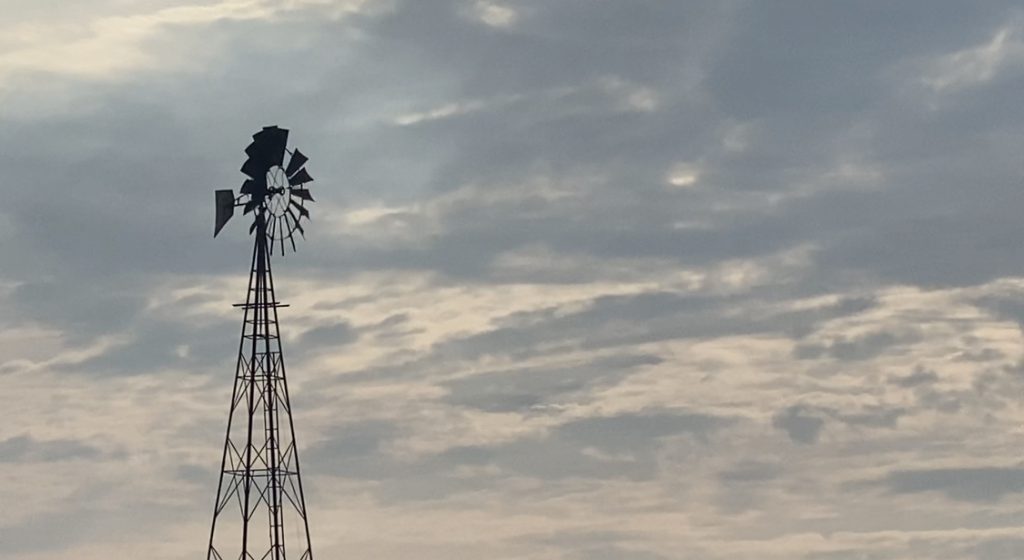
Living on Highway 55 (now Hwy P), we saw many hobos who took to the highway instead of the rails looking for something to do or a bite to eat, thinking maybe there was a job around the next corner. Those that walked the highway had the best chance of finding a job or getting something to eat as there were farms along the way. Farmers almost always grew more food than they needed, so they would share some with those in need, as most hobos were in need.
At this time, living in a city was harder than living on a farm. On the farm, we always had something to eat, as we raised almost everything we ate. As a child, I never remember going hungry, but I must say, it wasn’t always what I liked. Most people we knew who lived in the city knew someone or had relation on a farm who would give them some extra food. Those that walked the highway probably had no one to help them. Hobos were mostly good people in a bad time.
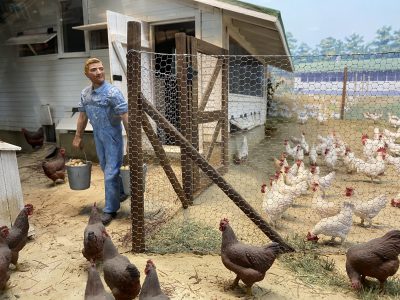
In the mid 1930’s, when I was about four or five years old, I do remember quite a few of these hobos stopping at our house. Maybe they had a way to tell other hobos that our house was a good place to stop. They were all men that came looking for a bite to eat, never a woman that I can recall. We probably got more hobos than most families did because our home was on Highway 55, the main road from Milwaukee.
These hobos would stop at our house and ask Mom if there was something they could do to help her in exchange for a cup of coffee and a sandwich. This was a common thing at the time when I was a young boy. Mom would always give them something to eat because they really didn’t have anything. It wasn’t a big thing for her to give them something, but it was a big thing to these guys to have something to eat.
Sometimes Mom would ask first if they would help her with a small job. If they said yes, she would give them some coffee and food, regardless if they did the work or not. I think she just wanted to make sure that they would be willing to work. I really never recall Mom turning a person down when they asked for a sandwich. Mom would give them a sandwich and a cup of coffee which they could eat in the back porch where mom did the washing, and then they’d be on their way to wherever they were headed. Most of the time though, they ate outside.
Click HERE to read more stories about local history by Dave Bohn
I think Mom didn’t have a problem giving most of these hobos something to eat as long as they looked fairly respectable. None of the hobos who stopped by worried Mom. She wasn’t afraid of them. We kids were never afraid of them either as they would talk to us. They probably knew that if they talk to the kids, they’d get something to eat. That was the first step of getting something to eat.
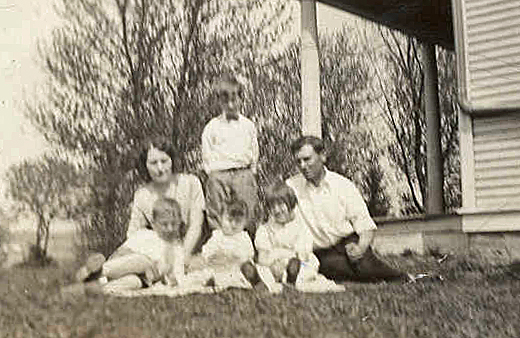
Most of the hobos I remember were pretty good guys and were probably just down on their luck due to the Great Depression. Most of them probably had jobs at one time but had lost them. It was a really hard time back then.
Some of the hobos would ask Dad for some work. Dad never did have any of them do any work for him as he always had a steady hired man until us boys, my brother Tom and I, were big enough to help with the farm work. But I guess some farmers did give hobos a job for a day or so if they needed extra help.
There were lots of hobos like this when we were little. Some of them would just walk and sleep in barns along the way. In the evening, sometimes hobos would stop and ask Dad if they could sleep in the barn hayloft. Dad didn’t let them sleep there as they might have smoked cigarettes and started the barn on fire. I don’t know where they would end up sleeping, but I suppose they just kept walking to the next farm. Some of them didn’t ask and I remember that Dad did find some hobos in the barn once in a while. Dad never really knew how many slept there.
Hobos are a thing of the past and we’ll probably never get them anymore. When the United States got involved in WWII, the era of hobos ended, and we didn’t see them stop by our farm anymore.
During this same time, when I was 4 or 5 years old, we had a hired man to help with the farm work. He wasn’t a hobo, but he traveled to get here. One called Vic. He was born in Poland. I don’t know his last name, but I think it might have been Provunka.
Vic would work on our farm in summer only. He helped Dad for two summers as that’s when Dad needed the most help. Vic would help with planting, milking cows, and the work in the fields. He arrived in spring before planting and stayed through the harvest season. Tom and I were too little to help at that time. I’m not sure how Vic met my dad. Maybe he just stopped in, asking for some work.
Vic had been discharged from the U.S. Army with a disability he got while on duty during WWI and he had some health problems. This was due to the poison gas used by the Germans. He was exposed to it while fighting on the front lines in France. I don’t know how much he took, but it damaged his lungs and caused a breathing problem. As a young kid, I never did know exactly what was wrong, but we would hear him coughing, especially at night. He had terrible coughing spells, and his breathing was affected from the gas for the rest of his life. He got a pension from the U.S. government for being a disabled veteran because of the poison gas problem.
Vic had an old touring car. It was a big car, not a Ford Model T or anything like that. He had a trailer house where he would live when he was at our place. His trailer house was not very big, maybe eight by 10 feet. It was parked down near the barn, not far from the silos. He also had a big dog, which we didn’t really mess with because he wasn’t our dog. Vic would travel south in the winter, with the car pulling the house behind him.
Sometimes we kids got to go into Vic’s trailer house, as he was a real nice guy to us kids. I can still remember his trailer house. We didn’t go in there very often, but once in a while we would. It was quite a mess inside. Vic would heat his trailer house with kerosene and the ventilation was not good. The smell inside was unbearable, especially for a kid. The fumes were pretty bad.
Vic was just like a family member. He would use our outhouse, a five-by-five foot two-holer. He would eat with us in our house, and I remember that Mom washed his clothes. Vic even went to Mass with us every week at Holy Angels. Vic always wore his Army uniform to church and to Sunday dinner.
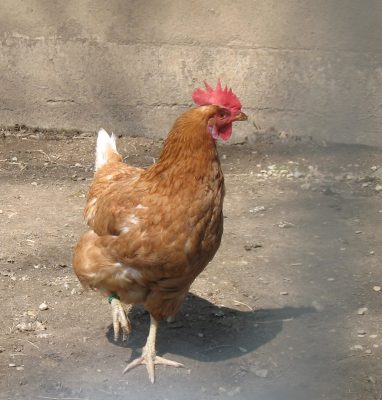
Most of the time, a rooster would make the supreme sacrifice and would be the main dish at Sunday dinner. For this meal, Vic would dress in his full Army uniform. Quite a sight for us kids! At that time, soldiers wore leather leggings while in full uniform. I remember that the leggings started at his ankles and went up to his knees. I think they were tight around his shins and may have just stayed up in place.
I guess Vic’s pay was one or two dollars a day or not much more. Vic was a really nice guy, and he was honest. I don’t think Dad ever got really chummy with him, but Vic was good with us kids and would talk to us and ask us questions, so we all liked him a lot. He was with us for two summers and I remember he was with our neighbor, Dan Ollinger, for a while, too.
During other years in the early 1930’s, Dad would hire some help, but only for the times when he needed an extra hand. Usually, it was young guys from the area, so probably some boys from neighboring farms. Or sometimes, it may have been a guy that stopped in looking for some work and Dad would hire him for a day or two. No one, other than Vic though, stayed at our farm and worked the entire summer.
There was another very interesting traveler on the road when I was young. He wasn’t a hobo or a hired hand. He was an old guy with a gray beard who would come along the road with a covered wagon pulled by goats. We called him the “Goat Man,” not to be confused with the Goat Man of Jackson Swamp. But maybe this was the start of the local goat man legend. I don’t know.
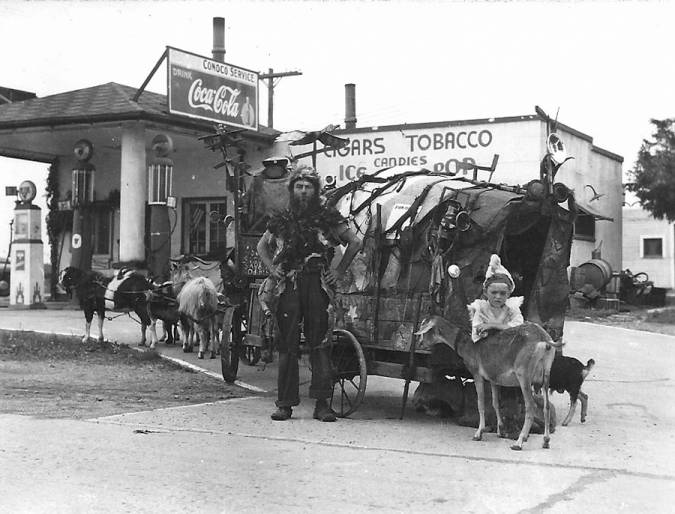
I first remember the Goat Man from when I was about five years old. He was traveling in a type of covered wagon pulled by eight or 10 goats, not horses. His wagon was a type of box wagon, loaded with stuff and covered with a tarp of some sort. He was kind of like the pioneers that traveled out west in the early days. His wagon was his home. He lived and slept in the wagon, just like the pioneers did.
He was quite a sight, walking down Highway 55 with his wagon and goats. There wasn’t much traffic back then, so even though our farm was on the main road, I think he just left his wagon on the side of the road when he stopped in. It was exciting for us kids to see him.
When we saw the Goat Man, he was traveling through the Midwest from South Dakota, I think. At that time, he was selling postcards of his wagon and his goats. Mom did buy a postcard from him. He was also selling some cooking pots and pans, but Mom didn’t buy any. As I understand it, most of the little money he needed to survive came from the sales of his postcards.
His name was Charles McCartney, but I didn’t know that at the time because we just knew him as Goat Man. That’s what he was called. We found out later he came from Iowa. When he stopped at our house, he would camp overnight on Rusco Drive just east of our house. He would walk the wagon over there and let the goats eat the grass by the roadside, sleep there overnight and continue on to . . . where? He just drifted around the country.
When he stopped by our house, Mom gave him something to eat, as we were eating dinner at the time if I remember right. I do remember that Goat Man talked a lot. He told us of his life and his travels. We didn’t have goats on our farm, only cows, so he also told us how he milked the goats. He would drink their milk. He would stop at streams along the way for water for the goats to drink. He told us he would drink the water, too, and he would also take a bath in these streams.
The Goat Man had 10 goats: eight to pull the wagon and two extra goats to pull when some of the goats got tired. The goats would graze on the grass along the side of the road. Goats eat anything, anything at all, so he never needed to buy food for the goats.
I don’t think he was going anywhere in particular. He was just traveling around, selling what he could and telling his story. The Goat Man was a big talker, so I think most people felt like they knew him and, just like Mom and Dad, they would invite him in and give him something to eat.
He would tell us kids stories of his life and travels and he was a wonderful storyteller. We kids thought he was wonderful to listen to. I wish I could remember his stories so I could tell them now. As a boy, his stories fascinated me, as all I knew of at the time was my life on our farm. Maybe that’s where my wanderlust began, as I grew to love travel.
The Goat Man returned a year later, so we did see him again and got to hear more stories, but that was the last time we saw him. We didn’t know what happened to him, but he and the goats made life interesting.
When I was in the service stationed at Camp Rucker, Alabama, I heard the Goat Man was traveling around the south. I had hitchhiked to Tallahassee, Florida on one of my leaves and wrote my folks the following on January 3, 1952: “Who do you think was in Tallahassee the other week? None other than the “Goat Man.” He wasn’t there when I was there but some people I got a ride with said he went through there. They said he had a woman with him and she was helping the goats pull the wagon. I guess one of his goats died or something, so she had to take over. He wasn’t up there over the summer, was he?”
Click HERE to read the obituary for Charlie “Goat Man” McCartney
That was the last story I heard about Goat Man: a woman taking the place of one of his goats! Goat Man lived an interesting life and told a wonderful story. Over the years, I wondered what happened to him. I recently read an article about him, talking about his life. It said he died in 1998 at the age of 97 in a nursing home in Georgia.
Click HERE to watch a video about The Goat Man Ches McCartney
All these travelers along the highway from my childhood days made an impression on me as a kid and they remain an interesting memory for me that I’ll never forget.


